- Home
- Sonya Hartnett
The Ghost's Child Page 11
The Ghost's Child Read online
Page 11
She thought about all the years she’d been without him, and said, “It is lovely to see you.”
All this talk of love abruptly became too much: the boy rolled his eyes in the manner of his grandfather, the iron man, and his mouth twisted down, an unravelling bow that Mama would have recognized. Matilda longed to hug him to her and squeeze him, feel the slimness of his bones and the featheriness of his hair and the warmth of his breath as he protested. The boy wore a cautious, amused expression, as if he knew exactly what she was thinking. But she stayed in her chair and kept her hands to herself, not wanting to torment him. “What happens now?” she asked.
“I think you just stand up, and walk away.”
“I don’t feel any pain,” she remarked.
The boy shrugged. “I think that sometimes there’s just sleep.”
Matilda knew he was right. As a doctor, she had witnessed all sorts of dying. She had seen long and tiring struggles, conflicts waged like whirlwinds; and she’d seen dying that came quietly as a moth into the room, on soft dun fluttery wings. She wondered what had failed her – her heart, or her mind. Both of them, she had to admit, were in need of a rest. “Will you come with me?” she asked the boy, hopingly. She did not think she could bear to lose sight of him again.
“Yes.” He nodded loosely. “I’ll come.”
Matilda looked around the lounge room for a final time, saying silent farewell to the objects that had decorated her life. Though she’d tried to do otherwise, she had never been able to stop cluttering her present with her past. Now somebody she didn’t know would pack her treasures into plastic bags and carry them away. A life, at its end, is a pile of cloth and paper, and goods that can be bagged and labelled. None of the best things – the voice and the laugh, the tilt of the head, the things seen and felt and spoken – are allowed to stay behind.
Gazing about, Matilda remembered Peake, who was asleep on his mat. “What about my dog?” she asked, immediately alarmed. There is kindness in having the courage to say goodbye, but she could not leave her dog. There was no one who would care for him, no one who loved him much. The boy, however, answered calmly, “Peake can come. This is such a stuffy room – there’s no fresh air in here. That heater is puffing out bad fumes. They make you too lazy to breathe, or stand, or let a dog out to chase cats. So Peake had better come too.”
And Matilda realized it then, the dull slumberousness that was oozing past the heater’s flames, as dangerous and overlookable as a snake coiled under a couch. She had lived her life alongside the elements – rock, earth, water, fire. The air that had filled her sails and kept her alive was now draining her strength and shutting her eyes. “Poor Peake,” she whispered. “I’m sorry for being so careless. I should have called a plumber.”
The boy said consolingly, “It will be nice to have Peake with us.”
They looked at each other, and smiled with the nervous excitement of travellers beginning a journey. When she stood, Matilda was pleased to find that her limbs were weightless and her joints didn’t ache. She looked down at the old lady who slumped in the chair, seeming nothing more unusual than asleep. On her face were the remnants of a smile. She had witnessed the world’s most beautiful things, and allowed herself to grow old and unlovely. She had felt the heat of a leviathan’s roar, and the warmth within a cat’s paw. She had conversed with the wind and had wiped soldiers’ tears. She had made people see, she’d seen herself in the sea. Butterflies had landed on her wrists, she had planted trees. She had loved, and let love go. So she smiled.
Matilda turned to the boy, who stood by the door. “Is it peaceful, where we are going?”
She held her breath waiting for his answer.
The boy said, “Only if you want it to be.”
Beyond the door, very oddly, was an emerald ocean and a blue sky. A wooden boat bobbed on the water, and Matilda and the boy stepped into it. Matilda looked back to the little dog who lingered behind, uncertain if he had been invited. “Come on, Peake,” she said, and he ran to her, springing into the boat. The boy hauled up the anchor and Matilda hoisted the sails; the slim boat caught the billowing breeze, jumped the ripples of frothy green waves, and was away.
Sonya Hartnett was born in Melbourne, the second of six children. Her first book, Trouble All the Way, was written when she was just thirteen and published two years later. Since then she has gone on to write numerous successful novels, including Thursday’s Child, winner of the 2002 Guardian Children’s Fiction Prize; What the Birds See, which won the prestigious Age Book of the Year in Australia; Stripes of the Sidestep Wolf and Surrender, which was a Michael L. Printz Honor Book. The Ghost’s Child has been shortlisted for the Commonwealth Writers’ Prize.
By the same author
Stripes of the Sidestep Wolf
Thursday’s Child
What the Birds See
Surrender
The Silver Donkey
This is a work of fiction. Names, characters, places and incidents are either the product of the author’s imagination or, if real, used fictitiously.
Published by arrangement with Penguin Books Australia Ltd
First published in Great Britain 2008 by Walker Books Ltd
87 Vauxhall Walk, London SE11 5HJ
Text © 2007 Sonya Hartnett
Illustrations © 2008 Jon McNaught
The right of Sonya Hartnett and Jon McNaught to be identified as author and illustrator respectively of this work has been asserted by them in accordance with the Copyright, Designs and Patents Act 1988
All rights reserved. No part of this book may be reproduced, transmitted or stored in an information retrieval system in any form or by any means, graphic, electronic or mechanical, including photocopying, taping and recording, without prior written permission from the publisher.
British Library Cataloguing in Publication Data:
a catalogue record for this book is available from the British Library
ISBN 978-1-4063-4268-0 (ePub)
www.walkerbooks.co.uk

 Butterfly
Butterfly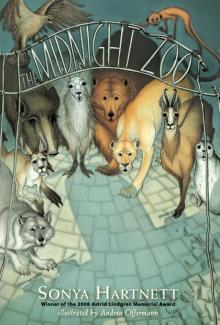 The Midnight Zoo
The Midnight Zoo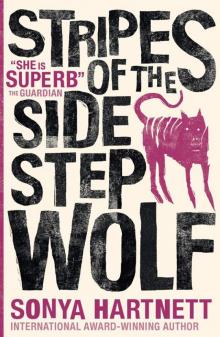 Stripes of the Sidestep Wolf
Stripes of the Sidestep Wolf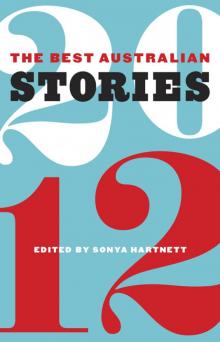 The Best Australian Stories 2012
The Best Australian Stories 2012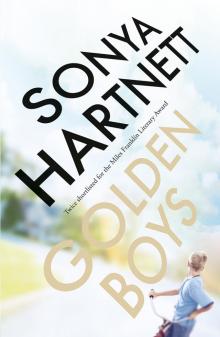 Golden Boys
Golden Boys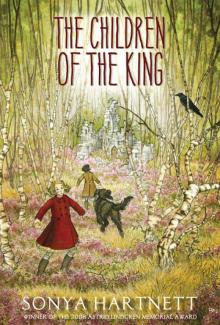 The Children of the King
The Children of the King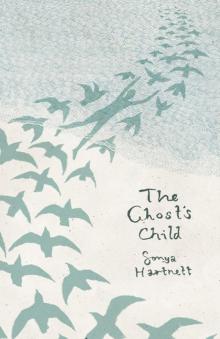 The Ghost's Child
The Ghost's Child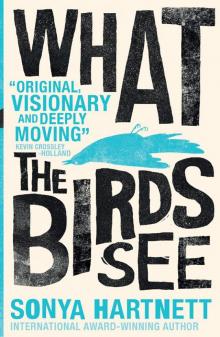 What the Birds See
What the Birds See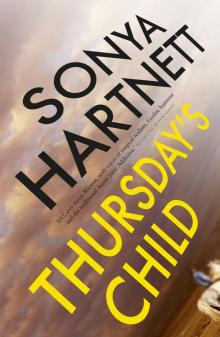 Thursday's Child
Thursday's Child